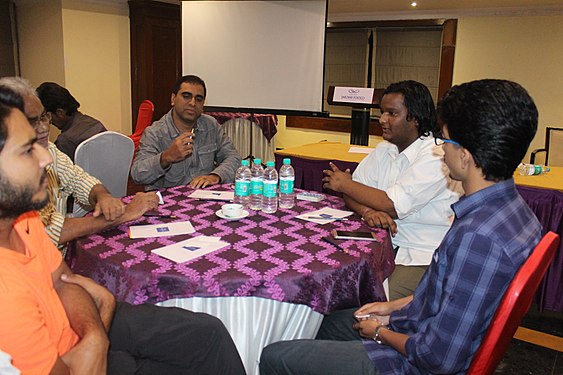User:Gopala (CIS-A2K)/1
| August 2018 | September 2018 | |
| Wikipedia Education Program at Christ University Wiki Advanced Training |
Intensive Personalised Wiki Training Session at Pune Wikigraphists Bootcamp (2018 India) |
Copyright workshop for Punjabi-community |
| October 2018 | November 2018 | December 2018 |
| South India Copyright Workshop 2018 | Indic Wikisource Community Consultation 2018 | Workshop of Agrani River activists, Dist. Sangli Advanced Wikidata Training Project Tiger Training 2018 |
Project Tiger Training 2018[edit]
![]() What? Project Tiger Training was a residential workshop for Wikipedians in India. The theme of the workshop Wikipedia content creation and improvement. We discussed and trained several topics related to creating content on Wikipedia in a better way.
What? Project Tiger Training was a residential workshop for Wikipedians in India. The theme of the workshop Wikipedia content creation and improvement. We discussed and trained several topics related to creating content on Wikipedia in a better way.
![]() Why? Wikipedia is an important Wikimedia project, and almost all Indian Wikimedia communities are actively working on Wikipedia. The objective of the workshop was to discuss/train different Wikipedia policies, tools those help content-creation and global content-creation initiatives such as Wikipedia Asian Month
Why? Wikipedia is an important Wikimedia project, and almost all Indian Wikimedia communities are actively working on Wikipedia. The objective of the workshop was to discuss/train different Wikipedia policies, tools those help content-creation and global content-creation initiatives such as Wikipedia Asian Month
![]() When and Where? The workshop took place on 29 June – 1 July 2018 at Ranchi, Jharkhand, India.
When and Where? The workshop took place on 29 June – 1 July 2018 at Ranchi, Jharkhand, India.
![]() How? The aim of the workshop was to train and groom these Wikipedians to write even better quality content on Wikipedia. 23 Wikimedians from 12 Indian language communities participated in this workshop. 4 of them were female. Some of the topics discussed during the workshop were: Wikipedia article structure, Good article, core Wikipedia policies such as Neutral point of View, Verifiability, getting resource support from The Wikipedia Library. User:KCVelaga and User:Satdeep Gill participated as trainers. User:Jayprakash12345 attended the workshop to provide technical support and suggestion. User:AddisWang joined remotely to discuss how he planned Wikipedia Asian Months and the best practices follow when someone wants to conduct large edit-a-thons. A detailed narrative report of this event may be seen event page. After the event, a couple of participants wrote detailed reports on their participation and learning experience. Please see a graphic report by Punjabi Wikimedian User:Manavpreet Kaur here. Kannada Wikimedian User:Vikashegde wrote this report.
How? The aim of the workshop was to train and groom these Wikipedians to write even better quality content on Wikipedia. 23 Wikimedians from 12 Indian language communities participated in this workshop. 4 of them were female. Some of the topics discussed during the workshop were: Wikipedia article structure, Good article, core Wikipedia policies such as Neutral point of View, Verifiability, getting resource support from The Wikipedia Library. User:KCVelaga and User:Satdeep Gill participated as trainers. User:Jayprakash12345 attended the workshop to provide technical support and suggestion. User:AddisWang joined remotely to discuss how he planned Wikipedia Asian Months and the best practices follow when someone wants to conduct large edit-a-thons. A detailed narrative report of this event may be seen event page. After the event, a couple of participants wrote detailed reports on their participation and learning experience. Please see a graphic report by Punjabi Wikimedian User:Manavpreet Kaur here. Kannada Wikimedian User:Vikashegde wrote this report.
Learning[edit]
- This was a Wikipedia workshop and we named it "Wiki Advanced Training". Our idea was to conduct an "advanced training" annually focusing a particular project (such as Wikipedia, Wikisource etc.) every year. However, this idea was not well-communicated to the community, and right after the event announcement, we got feedback on this. We admit a mistake here. In our next activities/next iteration of Wiki Training, we'll clarify in a better way to avoid confusion.
Follow-up[edit]
- The workshop took place in July 2018. After the workshop, we saw a couple of events which were outputs of this workshop. We have written about these events and activities in Independence day edit-a-thon, Wiki Women for Women Wellbeing 2018, and Indic-Techcom sections
- We would like to conduct a second Wiki Advanced Training after July 2019. We have not decided the project yet, however, we think that the next iteration will cover any other Wikimedia project other than Wikipedia (as in 2018 that was our focus)
-
Group photo
-
Participants discussing
-
Poster presentation at WAT
Metrics[edit]
-
Poster presentation at WAT
-
Odisha fire personnel leaving for 2018 Kerala floods.
| Metric | Achieved outcome | Explanation |
| 1.Participants | 1,840 | CIS-A2K is working with all most all the Indic languages which has helped us to reach this target. |
| 2. Newly registered | 627 | CIS-A2K with thematic edit-a-thons and WEP related activities have been able to attract new editors. |
| 3. Content pages |
|
Thematic and large scale edit-a-thons anchored by A2K and collaborative work with other institutions has helped A2K to get more and more content. |
| 4. Footprint tracker | 22 | |
| 5. Community Evaluation | { |





